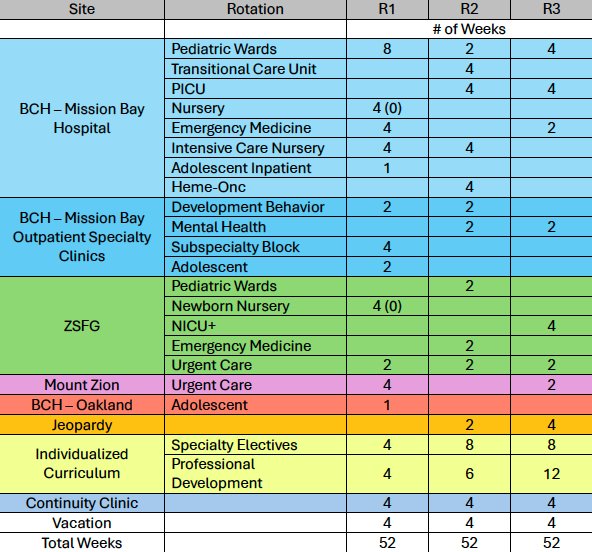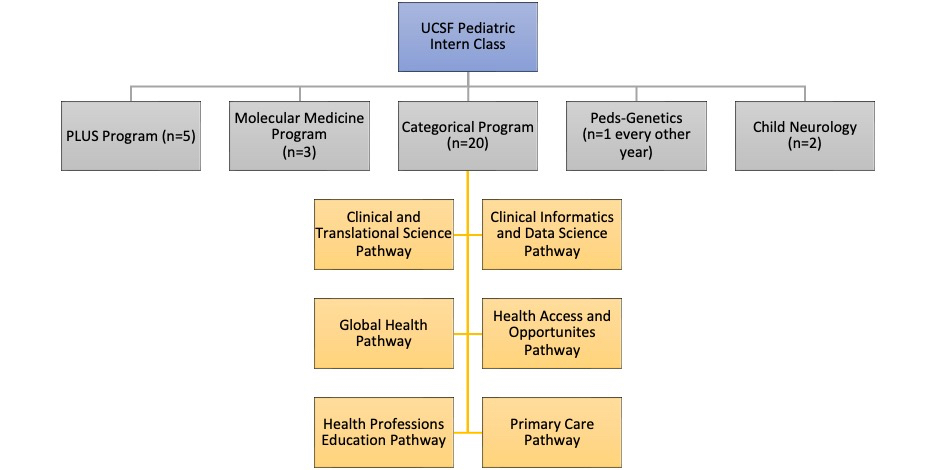Programs and Pathways
We offer several programs and pathways designed to support individuals' clinical passions and scholarly pursuits.
Programs
Medical school graduates enter one of our programs through the Match: Categorical, PLUS, Child Neurology, Molecular Medicine, and Pediatrics/Medical Genetics. Each has separate ERAS application markers and unique NRMP numbers.
Differences between the programs are described below, but all share a common core curriculum of general and subspecialty-based pediatric experiences in inpatient, ambulatory, newborn, and neonatal/pediatric intensive care settings.
Categorical Program
The goal of the Categorical Program is to provide outstanding clinical training to prepare residents to enter any field of general or subspecialty pediatrics. Residents spend one half day of each week in the Continuity Clinic and augment core rotations with subspecialty experiences and electives. Residents in this program are eligible to participate in the Primary Care Track if they desire and/or one of five interest-based pathways. We encourage applications to the Categorical program from applicants who have broad interests, undifferentiated interests, and interests in primary care as well as traditional academic and subspecialty careers.

Child Neurology Program
The UCSF Child Neurology Residency Program is widely considered among the top child neurology training programs in the country. The program consistently attracts the brightest and most talented future child neurologists with the goal of training our future colleagues in the field to become excellent clinicians, researchers, and educators. The Child Neurology training program accepts trainees from a broad range of backgrounds and experiences, with variable goals for their future. Our goal is to provide trainees with a breadth of experiences in the field and to allow them to pursue their passions and develop into leaders in our field.
Combined Pediatrics/Medical Genetics and Genomics Program
The Combined Pediatrics/Medical Genetics Program is a 4-year program that strives to train individuals with a passion for both pediatrics and medical genetics. Residents spend their first year of training in Pediatrics. Residents alternate their time between Pediatrics and Genetics rotations during years 2-4. The residents participate in a General Pediatrics Continuity Clinic throughout years 1 & 2, and a Pediatric Genetics and Metabolism Continuity Clinic during years 3 & 4. Upon graduation from this program, graduates will be eligible to sit for the ABP General Pediatrics and ABMGG Clinical Genetics and Genomics certification exams. We match one resident to this program every other year and welcome applicants from a broad range of backgrounds and experiences.

Molecular Medicine Program
The Molecular Medicine Program is designed for individuals who are interested in pursuing a career that emphasizes bench research in combination with the practice of medicine. The overarching goal of the program is to train the next generation of transformative laboratory-based physician-scientists. We screen all applicants to identify individuals who have demonstrated outstanding potential for a physician-scientist career. Those applicants who have demonstrated a commitment to and productivity in biomedical research are invited to consider the Molecular Medicine Program. This does not require dual MD/PhD degrees.

PLUS: Pediatric Leaders Advancing Health Equity Program
Developed from a desire to address differences in health access and outcomes suffered by children both in the United States and around the world, as well as the urgency to train pediatricians to lead change in the healthcare system, the UCSF Pediatrics Residency Program developed the innovative PLUS program.
Pathways
Residents in the Categorical Program have the option of applying to participate in one of our interest-specific Pathways. Pathways provide a way for residents to build on their individual interests and passions and/or explore new interests. The central feature of most Pathways is an expectation to complete coursework and a mentored longitudinal project (for which we provide protected time during call-free blocks).
After the match, all residents matching into the Categorical Program have the option, but are not required to, apply to one of several tracks. The majority of these take place in the 2nd and 3rd year of residency, though there are opportunities in some for some early exposure and connection to understand offerings and alignment with career goals.
About halfway through the first year of training, residents have the option of applying to participate in one of our Pathways, most of which are GME-wide (the exception is Primary Care). The purpose of a Pathway is to allow residents to develop a specific set of skills that could be useful across a broad range of clinical areas and to pursue mentorship and scholarship – defined broadly – as a part of that Pathway.
Each Pathway has a lead; the ones with asterisks have Pediatric-specific leads
- Clinical & Translational Science*
- Clinical Informatics and Data Science
- Global Health*
- Health Access and Opportunities
- Health Professions Education
- Primary Care*
- This pathway is specific for Pediatrics and gives residents enhanced training in Pediatric Primary Care including didactic sessions, a longitudinal project and extra outpatient clinical experiences as a part of their elective time.

Clinical Informatics and Data Science Pathway
The Clinical Informatics and Data Science (CI-DS) Pathway provides an opportunity for participants to learn basic concepts, principles, and skills in these fields and serves as a resource to explore potential careers in these areas.
Clinical and Translational Science Pathway
The Clinical and Translational Science Pathway builds resident skills in clinical research design and biostatistics. This is a great option for residents considering a career in clinical research. This pathway builds on the pediatrics department’s strong relationship with the Clinical and Translational Science Institute at UCSF and includes formal coursework in research design as well as a cohort-based mentoring program and mentored longitudinal project.
Global Health Pathway
The Global Health Pathway seeks applicants with a specific commitment to global health. Future plans may include clinical work, research, and program or policy development relating to global health. Participants obtain clinical experience in a resource-limited country, join a local community of like-minded faculty and trainees from a variety of specialties and disciplines, participate in a didactic curriculum specifically addressing issues of global health, and complete a mentored scholarly project relating to global health.
Health Professions Education Pathway
The Health Professions Education Pathway aims to prepare residents for a career in medical education. It is integrated with the Health Professions Pathways to Discovery program in the UCSF School of Medicine. Residents complete formal coursework in medical education and curricular design, as well as complete a mentored scholarly project.
Health Access and Opportunities Pathway
The Health Access and Opportunities Pathway engages learners in conversations, skill building, and reflection around improving health access outcomes for all populations, promoting equity in the medical workforce, and actively promoting inclusion and addressing barriers to access. Learners will explore issues of identity, privilege, and bias through discussion, experiential learning, community engagement, and critical self-reflection.
Primary Care Pathway
Primary Care Pathway residents are trained in clinic and community-based approaches to child health. A growing model in pediatrics is the bridging of primary care with community health. Throughout their training, residents are exposed to multiple facets of primary care through seminars, resident meetings, and individually-tailored call-free elective blocks in each year of residency. During their primary care blocks, residents have time dedicated to community engagement and/or primary care research projects as well as primary care-related subspecialty experiences.
